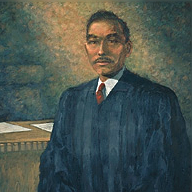Edward Orval Gourdin was a Great Harvard Scholar, Athlete, Soldier & Judge.
One of the first achievements of Edward Orval Gourdin was to graduate from The Stanton High School in Jacksonville, Fla. in l9l6 as Class Valedictorian. This was the first school established in the State of Florida for Negro Education in l868 after the civil war.
Harvard scholar
His parents recognized his abilities as a scholar and athlete and decided to move to Cambridge, Massachusetts, where he completed one year of college preparatory work at Cambridge High and Latin before entering Harvard in the fall of 1917.
Gourdin's freshman diary reveals an organized and responsible young man. On September 24 he notes the posting of a security bond for $400 and payment of $50--the first installment of his tuition fee. A few days later, he lists the schedule for the first day of classes and reminds himself: "Take 1st wks reading and map study for Monday."
athlete
He also distinguished himself in track. He became the National Amateur Athletic Union's junior 100-yard dash champion in 1920 and the national pentathlon champion in 1921 and 1922. At the revival of the Harvard-Yale versus Oxford-Cambridge track meet, in 1921, Gourdin won the 100-yard dash and set a new world record (25 feet, 3 inches) in the broad jump. In 1924, having completed his law school exams, he traveled to Paris for the Olympics and won a silver medal in the broad jump.
judge
No law firm offered him a position, and increasingly his attention turned to the public sector. He became active in politics, first as a Republican; his conversion to the Democratic party in the early 1930s led to many relationships with political figures and attorneys in Boston, including Francis J. W. Ford '04, LL.B. '06, an influential lawyer whose classmate, Franklin Delano Roosevelt, had named him U.S. attorney for the district of Massachusetts in 1933. In 1936, with Ford's backing, Roosevelt appointed Gourdin assistant U.S. attorney, a position he would occupy, save for the war years, until 1951.In Boston, he resumed his duties as assistant U.S. attorney and had been promoted to chief of the civil division before his elevation to the bench in 1951.




